1962 World Championships— Lucerne Switzerland
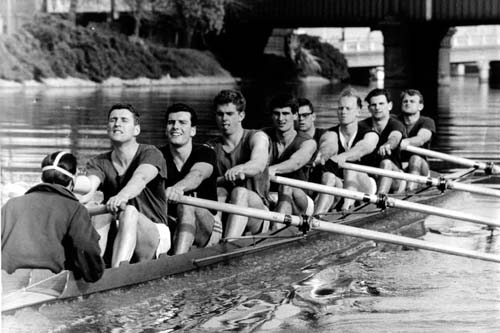
Men's Eight training in Melbourne
The regatta was perfectly organised with a huge number of spectators together with a vast number of television viewers in many European countries.
The President, Thomas Keller, suggested, innovatively, that the 7-12 final be held in the mornings and this has been the format ever since. The procedure was endorsed by the FISA Congress in 1963. Also the playing of national anthems and raising of national flags were replaced by the FISA anthem. This was maintained for many years but has now reverted to national anthems.
East Germany was still not recognised by FISA, and East and West Germany were allowed to enter with one crew between them per event. Accordingly, the day before the Championships, selection trials took place between the representative crews of both Germanies. West German crews won in all categories.
A small number of images from team members from this regatta can be found at: 1962 World Championships (australianrowingimages.com)
Selection
For the Australian Amateur Rowing Council this was uncharted territory: there was no mechanism in place for dealing with selection or funding for World Championships teams. The AARC's only experience was with Olympic and Commonwealth Games teams for which there were clear cut funding and selection precedents. Much fundraising had to occur, and Alan Jacobsen and Noel Wilkinson worked hard on this work.
The Australian eight, which was selected for the 1962 Perth Commonwealth Games, was encouraged to represent Australia at these first World Championships. Unfortunately no funding was available and the crew members financed themselves.
There was one change in the Commonwealth Games crew: Duncan Stankovich withdrew for study reasons and was replaced by David Boykett. lan Tutty was similarly selected through Commonwealth Games selection.
The Commonwealth Games selection process also served as the basis for selecting the four. Test races were held at Ballarat during Easter 1962 for the small boats for the 1962 Commonwealth Games.
The winner of the fours race was the Corio Bay (VIC) crew of David McL John (bow), David M Caithness (two), Derreck E Norwood (three), David B Ramage (stroke), P Sarah (cox) and Albert Bell (coach). They were also offered the right to compete in Lucerne, but were unable to make the tour.
The second placed crew from MUBC/Yarra Yarra (VIC) was able to go and was duly selected. At the same time, Geoff Mclntyre of Haberfield Rowing Club wrote to the AARC from London saying he was going to attend the Championships and offered his assistance in any capacity. His offer was gratefully received and he became a most efficient team manager. Geoff was also the delegate to the FISA Congress and surprised those present by making his address in fluent french. The eight and coxed four raced in Swiss Stampfli boats.
Racing
The eight performed well despite illness during its time in Europe. The crew benefitted from a row in the repechage to be able to defeat their heat winner in the final.
The experience of international competition was invaluable; the inexperience of the eight indicated by it having the fastest last 500m.
The four's performance mirrored that of the eight and was impressive in such competition. lan Tutty finished valiantly in the small final. Ultimately the crews were also affected by their lack of international competition, the quality of the equipment and the efforts required for fundraising.
The Germans won all sweep oared events. This achievement was a high point in the career of the great German coach Karl Adam and his team.
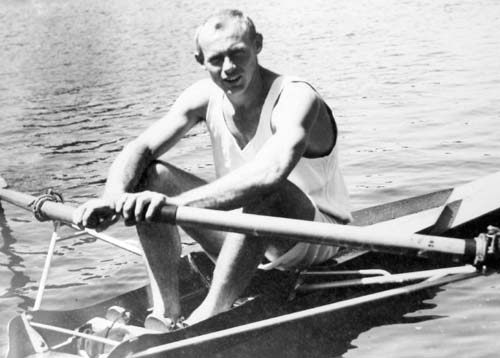
Ian Tutty, Men's Single Scull
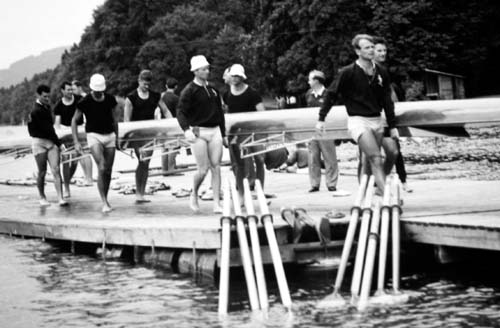
Men's Eight in Lucerne
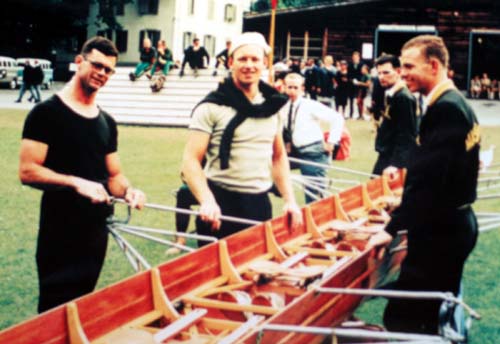
Rigging the Eight
L-R: Terry Davies, David Boykett and Simon Newcomb
Australian Team
Men's Single Scull—Tenth
lan Tutty (NSW)
Men's Coxed Four—Fifth
Bow: John Castle (VIC)
2: Robin Jones (VIC)
3: Peter Edwards (VIC)
Str: James Howden (VIC)
Cox: Kevin Wickham (VIC)
Cch: Ron Jelbart (VIC)
Men's Eight—Fifth
Bow: lan Douglas (VIC)
2: Charles Lehman (VIC)
3: David Boykett (VIC)
4: Terry Davies (VIC)
5: Paul Guest (VIC)
6: Graeme McCall(VIC)
7: Martin Tomanovits (VIC)
Str: Neville Howell (VIC)
Cox: David Palfreyman (VIC)
Cch: Alan Jacobsen (VIC)
Reserve: Simon Newcomb (VIC)
Manager: Geoff Mclntyre (NSW)
Results
Men's Single Scull
E1: 1st GBR, 2nd NED, 3rd NZL, 4th USA, 5th ITA, 6th ISR
E2: 1st URS, 2nd DEN, 3rd TCH, 4th NOR
E3: SUI, 2nd GER, 3rd AUS, 4th FIN, 5th JPN
R1: 1st NED, 2nd AUS, 3rd NOR
R2: 1st NZL, 2nd FIN, 3rd DEN, 4th ISR, 5th JPN
Final B: 7th TCH, 8th FIN, 9th GER, 10th AUS, 11th DEN
Final: 1st USSR (Viatscheslav Ivanov) 7.07.09; 2nd Great Britain (Stewart McKenzie - 1956 and 1960 Australian
Olympian) 7:10.67; 3rd USA 7:11.88; 4th Holland 7:13.83; 5th Switzerland 7:18.95; 6th New Zealand 7:20.26.
Ivanov was the Olympic Champion in 1956 and 1960. His main opponent during the same period was Stuart MacKenzie of Australia. McKenzie was again his main opponent but this time representing Great Britain. Ivanov trailled the field until the last 500 metres when he rowed through to win.
Men's Double Scull
E1: 1st GER, 2nd DEN, 3rd SUI, 4th BEL, 5th AUT
E2: 1st FRA, 2nd NED, 3rd NOR, 4th ISR
E3: 1st GBR, 2nd TCH, 3rd URS, 4th USA
R1: 1st URS, 2nd DEN, 3rd AUT, 4th ISR
R2: 1st NED, 2nd SUI, 3rd USA
R3: 1st TCH, 2nd BEL, 3rd NOR
Final B: 7th SUI, 8th DEN, 9th USA, 10th BEL, 11th NOR, 12th AUT
Final: 1st France (Rene Duhamel, Bernard Monnereau) 6.33.90; 2nd USSR 6:34.74; 3rd Germany 6:34 92; 4th Czechoslovakia 6:37.09;
5th Great Britain 6:42.09; 6th Holland 6:46.93.
Men's Coxless Pair
E1: 1st SUI, 2nd FIN, 3rd CAN, 4th TCH, 5th BEL, 6th SWE
E2: 1st NED, 2nd URS, 3rd ITA, 4th NOR
E3: 1st GER, 2nd POL, 3rd GBR, 4th DEN, 5th JPN
R1: 1st FIN, 2nd GBR, 3rd NOR
R2: 1st URS, 2nd CAN, 3rd DEN, 4th SWE, 5th JPN
R3: 1st POL, 2nd ITA, 3rd TCH, 4th BEL
Final B: 7th GBR, 8th ITA, 9th CAN, 10th TCH, 11th DEN, 12th NOR
Final: 1st Germany (Dieter Bender, Gunther Zumkeller) 6.54.62; 2nd USSR 6:58.19; 3rd Switzerland 7:05.59; 4th Poland 7:06.38; 5th
Finland 7:08.97; 6th Holland 7:09.98.
Men's Coxed Pair
E1: 1st USA, 2nd DEN, 3rd TCH, 4thSUI, 5th NOR
E2: 1st URS, 2nd POL, 3rd ITA, 4th NED
E3: 1st GER, 2nd ROM, 3rd HUN, 4th SWE
R1: 1st DEN, 2nd NED, 3rd HUN, 4th NOR
R2: 1st POL, 2nd TCH, 3rd SWE
R3: 1st ROM, 2nd SUI, 3rd ITA
Final B: 7th TCH, 8th SUI, 9th NED, 10th HUN, 11th SWE, ITA did not finish.
Final: 1st Germany (Klaus Gunther, Jordan Wolfgang Neuss, Frank Steinhauser) 7.19.10; 2nd Romania 7:22.60; 3rd
USSR 7:24.17; 4th Denmark 7:26.35; 5th USA 7:26.73; 6th Poland 7:36.49.
Men's Coxless Four
E1: 1st ROM, 2nd TCH, 3rd AUT, 4th GBR, 5th JPN
E2: 1st SUI, 2nd CAN, 3rd NED, 4th ITA, 5th DEN
E3: 1st FRA, 2nd GER, 3rd URS, 4th YUG, 5th BEL
R1: 1st ITA, 2nd URS, 3rd TCH, 4th DEN
R2: 1st AUT, 2nd YUG, 3rd CAN, 4th BEL
R3: 1st GER, 2nd NED, 3rd GBR, 4th JPN
Final B: 7th URS, 8th TCH, 9th CAN, 10th YUG, 11th BEL
Final: 1st Germany (Gerd Wolter, Dagobert Tometschek, Peter Paustain, Christian Prey) 6.19.24; 2nd France;
3rd Austria; 4th Italy; 5th Switzerland; 6th Romania.
Men's Coxed Four
E1: 1st ROM, 2nd AUS, 3rd AUT, 4th USA, 5th SWE
E2: 1st GER, 2nd URS, 3rd POL, 4th FIN, 5th DEN
E3: 1st FRA, 2nd NED, 3rd ITA, 4th POR, 5th SUI
R1: 1st AUS, 2nd ITA, 3rd FIN, 4th DEN
R2: 1st URS, 2nd AUT, 3rd SUI, 4th POR
R3: 1st POL, 2nd NED, 3rd USA, 4th SWE
Final B: 7th ITA, 8th AUT, 9th FIN, 10th USA, 11th SWE
Final: 1st Germany (Bernd-Jurgen Marschne, Peter Neusel, Bernhard Britting, Jurgen Oelke) 6.29.12; 2nd
France 6:31.93; 3rd USSR 6:33.30; 4th Poland 6:35.13; 5th Australia 6:35.41, 6th Romania 6:39.38.
The Australians raced impressively making the final. However the lack of experience in this type of competition showed through.
Men's Eight
E1: 1st URS, 2nd ITA, 3rd GBR, 4th FRA, 5th ROM, 6th NED
E2: 1st CAN, 2nd AUS, 3rd YUG, 4th DEN, 5th JPN
E3: 1st GER, 2nd TCH, 3rd POL, 4th USA, 5th SUI
R1: 1st ITA, 2nd JPN, 3rd DEN, POL excluded.
R2: 1st AUS, 2nd GBR, 3rd SUI, 4th USA, 5th NED
R3: 1st FRA, 2nd TCH, 3rd YUG, 4th ROM
Final B: 7th TCH, 8th YUG, 9th GBR, 10th DEN, 11th JPN, 12th SUI
Final: 1st Germany (Bernd Kruse, Ingo Kliefoth, Karl-Heinrich von Groddeck, Hans-Jurgen Wallbrecht, Klaus
Behrens, Klaus Aeffke, Jurgen Plagemann, Horst Meyer, Thomas Ahrens) 5.50.83; 2nd USSR 5:53.56; 3rd France 5:55.36; 4th
Italy 5:57.10; 5th Australia 5:58.85; 6th Canada 6:00.15.
The first five crews all rowed under 6 minutes which was very quick for those times.
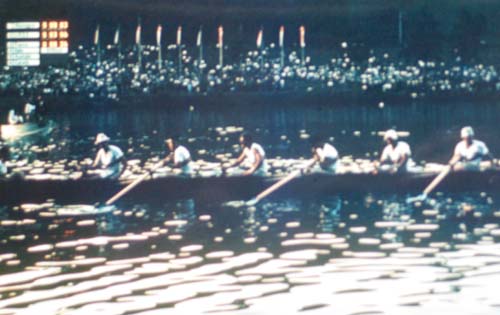
Men's Eight at Finish

